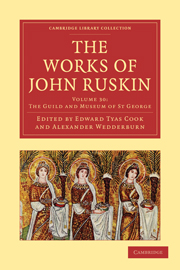Book contents
- Frontmatter
- Contents
- LIST OF ILLUSTRATIONS
- INTRODUCTION TO THIS VOLUME
- PART I THE GUILD OF ST. GEORGE
- PART II THE ST. GEORGE'S MUSEUM
- APPENDIX
- BIBLIOGRAPHICAL NOTE
- 1 LETTERS RELATING TO THE AFFAIRS OF THE ST. GEORGE'S GUILD (1875–1884)
- II LETTERS AND REPORTS RELATING TO THE ST. GEORGE'S MUSEUM (1875–1890)
- III INDUSTRIAL EXPERIMENTS IN CONNEXION WITH ST. GEORGE'S GUILD
- IV RUSKIN'S MAY QUEENS
- V THE RUSKIN CABINET AT WHITELANDS COLLEGE
- VI RUSKIN AND THE BOOKSELLERS
- Plate section
III - INDUSTRIAL EXPERIMENTS IN CONNEXION WITH ST. GEORGE'S GUILD
Published online by Cambridge University Press: 07 September 2011
- Frontmatter
- Contents
- LIST OF ILLUSTRATIONS
- INTRODUCTION TO THIS VOLUME
- PART I THE GUILD OF ST. GEORGE
- PART II THE ST. GEORGE'S MUSEUM
- APPENDIX
- BIBLIOGRAPHICAL NOTE
- 1 LETTERS RELATING TO THE AFFAIRS OF THE ST. GEORGE'S GUILD (1875–1884)
- II LETTERS AND REPORTS RELATING TO THE ST. GEORGE'S MUSEUM (1875–1890)
- III INDUSTRIAL EXPERIMENTS IN CONNEXION WITH ST. GEORGE'S GUILD
- IV RUSKIN'S MAY QUEENS
- V THE RUSKIN CABINET AT WHITELANDS COLLEGE
- VI RUSKIN AND THE BOOKSELLERS
- Plate section
Summary
Amongst the evils resulting from the gradual depopulation of the villages is that round us here, in Westmoreland, all the old trades are dying or dead—bobbin-turning, charcoal-burning, wood-carving, basket-making, hand-spinning and weaving—some are clean vanished, and others are the mere ghosts of their old selves. My own personal experiment has been to try and reintroduce the hand-spinning and weaving of linen. For years past Mr. Ruskin has been eloquently beseeching English men and maidens once more to spin and weave. Wordsworth, too, melodiously lamented the disuse of the spinning-wheel; but for all that, it was as practically extinct all over England as our great-grandmothers’ sedan-chairs. It figured on Covent Garden stage every season, but Margaret's thread was scarcely of a marketable quality. And if the wheels were obsolete, much more so were the distaff and spindle. When Lady Freake's pretty young ladies gave their Greek play some years ago, not one of them (nor the learned Professor who arranged them either) had any idea how to hold her distaff, much less how to spin a thread.
In the face of all this prevailing ignorance I determined to try and bring the art back to the Westmoreland women. Scattered about on the fell side were many old women, too blind to sew and too old for hard work, but able to sit by the fireside and spin, if any one would show them how, and buy their yarn. When I broached my scheme to a circle of practical relations a Babel of expostulation arose, wild as a Parsifal chorus. “It won't pay; no one wants linen to last fifty years; it's fantastic, impracticable, sentimental, and quixotic.”
- Type
- Chapter
- Information
- The Works of John Ruskin , pp. 328 - 335Publisher: Cambridge University PressPrint publication year: 2010First published in: 1907
- 1
- Cited by

